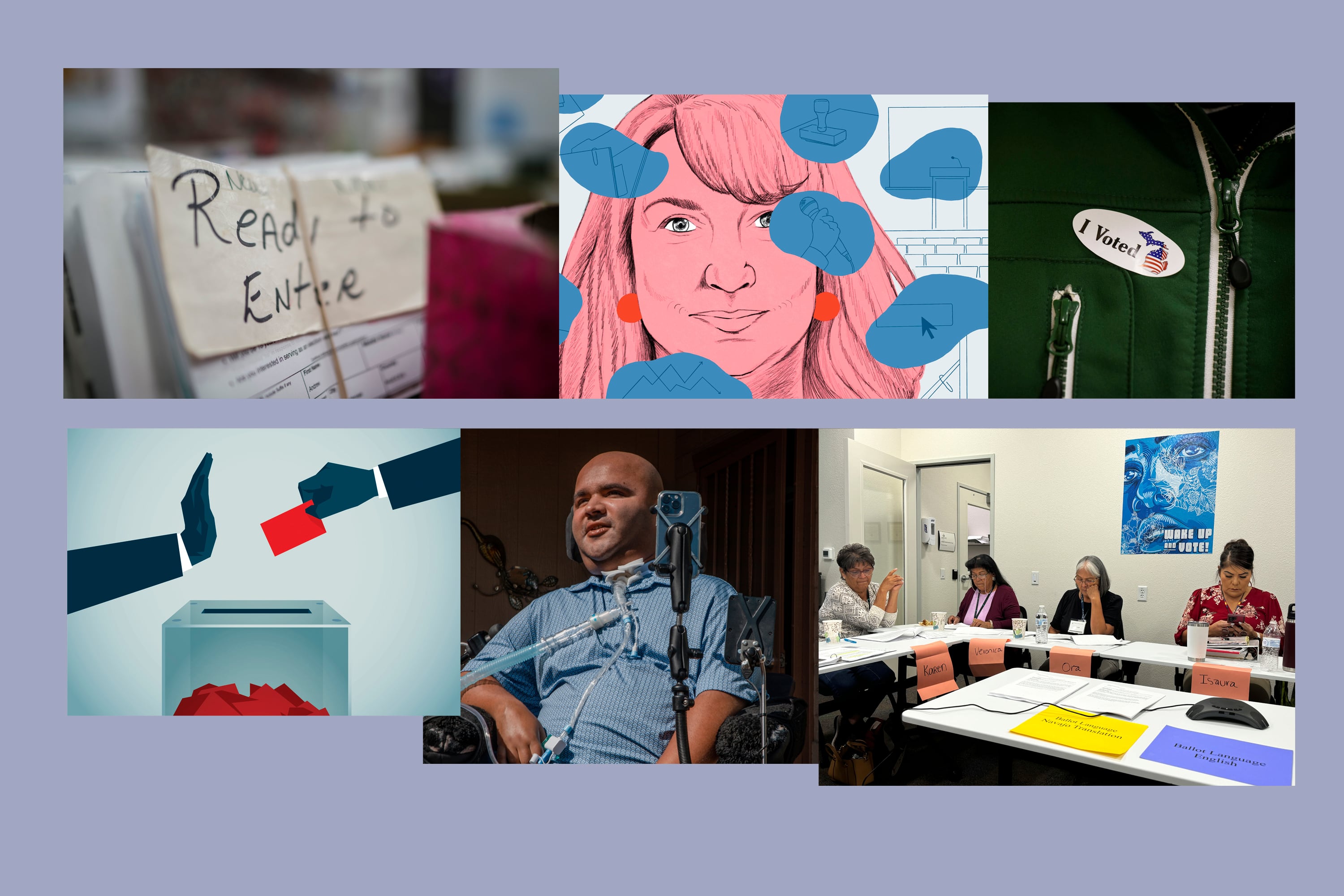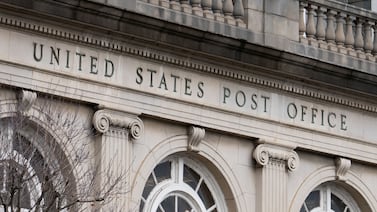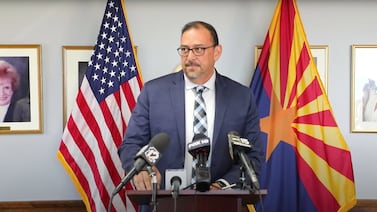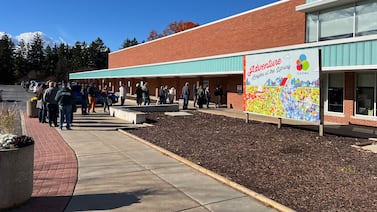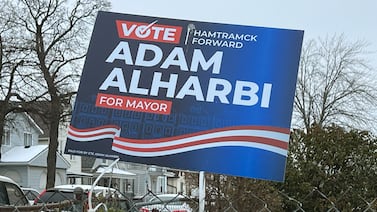Votebeat is a nonprofit news organization reporting on voting access and election administration across the U.S.
This news analysis was originally distributed in Votebeat’s free weekly newsletter. Sign up to get future editions, including the latest reporting from Votebeat bureaus and curated news from other publications, delivered to your inbox every Saturday.
Good morning,
Happy holidays to all the dedicated, smart, witty readers of this newsletter, and welcome to our last edition of 2024! Thanks for supporting our work this year. Before we all go our separate ways to celebrate the holidays, we asked Votebeat’s reporters to highlight some of their most memorable stories of the year. Here are their selections:
From Jessica Huseman:
In Shasta County, Calif., fights over elections have left wounds that just won’t heal
This story is from California, a state Votebeat does not typically cover. There, longtime election administrator Cathy Darling Allen faced a more concentrated version of the problems plaguing elected officials across the country — intense scrutiny and mistrust from local residents, spurred by conspiracy theories about Donald Trump’s loss in 2020. The situation became so overwhelming that Darling Allen chose to retire before her term officially ended, and after she was diagnosed with heart failure due to stress.
I was able to spend time in Shasta County and with Darling Allen and her staff, untangling how the situation there became so toxic. I found county leaders who lied to their constituents, a concentration of political extremism, and growing anxiety among lifelong residents that Shasta County had fundamentally changed for the worse.
From Jen Fifield in Arizona:
How Arizona tackles a language barrier to provide Navajo voters a ballot they can listen to
In Arizona, the Navajo Nation is a crucial voting bloc. High turnout on the nation in 2020 helped Joe Biden win the state. Yet about 7,000 voting-age Navajo residents in the state can’t read English proficiently, making it difficult for them to vote. The state is required to translate the ballot for those voters, but courts have found that election officials haven’t done enough to meet these requirements. We wanted to take a closer look.
In a partnership with Indian Country Today, we gained access to a crucial, typically closed meeting in which Navajo speakers tried to translate culturally sensitive and highly controversial ballot propositions into Navajo. That included a measure to secure abortion access in the state. Our story found that the lack of transparency into the process made it difficult for the Navajo community to ensure the ballot was properly translated on these key issues. The story was broadcast across Navajo Nation, on TV through our partnership with Indian Country Today, and in print in community papers serving the reservation. Voting rights groups used the story to continue to call for better translation services.
Signed, sealed, rejected: How Arizona’s system for verifying mail ballots is hurting key voters
Election margins are tight in Arizona, and races can turn on just a few hundred ballots. But in 2022, I noticed that the number of ballots rejected for mismatched voter signatures had tripled, to around 1,800 in Maricopa County alone. I knew the signature review process was designed to block potential fraud, but I also knew, from my time talking to voters in the state, that many voters didn’t even know the importance of the signature. I set out to figure out if this system was working as intended.
In a monthslong project with the Arizona Center for Investigative Reporting, we found that many signatures had been rejected not because they were fraudulent but simply because they were sloppy — meaning that ballots with legitimate signatures were not getting counted. This was often the case for younger and newer voters who only had an e-signature on file. This flaw in the system will be an important target as lawmakers look for ways to improve voting in the state.
From Hayley Harding in Michigan:
No, Michigan does not have more voters than residents eligible to vote
In Michigan, misunderstandings about how the state maintains its voter rolls quickly blew into something bigger as Elon Musk and other conservative activists spread bad information across social media. Michigan has about 8.4 million registered voters and only about 7.9 million residents older than 18. But that’s the result of Michigan’s proactive voter registration policies — everyone eligible to vote is registered when they get a driver’s license in the state, for instance. There are only about 7.2 million active voters in Michigan, with the remainder on the rolls being the dormant records of people who have left Michigan or died, but whose records haven’t yet been removed because of federal laws that restrict such removals.
Votebeat’s reporting on this issue helped to slow the spread of incorrect information and restore trust in the state’s election system during the critical last few weeks before the November election.
From Carter Walker in Pennsylvania:
This Pa. activist is the source of false and flawed election claims gaining traction across the country
Missing voting machine documents raise concern about Pa. county’s testing processes
These two stories share a common theme: They didn’t end with the 2024 presidential election.
In the first story, I took an in-depth look at how Pennsylvania resident Heather Honey had quietly become one of the most influential voices in the conservative election integrity movement. By meticulously fact-checking her report and advocacy on ERIC, an obscure multistate coalition for voter list maintenance that’s been the subject of conservative pushback, we demonstrated how the Lebanon County-based researcher often omitted facts and selectively analyzed data in a way that produced flawed conclusions.
The second story detailed how simple process missteps can lead to big election problems. Before each election, counties must test voting machines to ensure they are functioning properly. After voters in Northampton County noticed a programming error in the 2023 municipal election, it was immediately apparent that officials had not properly tested the county’s machines. They admitted as much. By reviewing thousands of documents, despite the county’s heavy restrictions on my access, I showed that the county’s testing documentation was incomplete, inconsistently filled out, and, in more than 150 instances, missing entirely.
Election administrators are going to continue to make mistakes, and outside observers are going to continue to misinterpret how our elections infrastructure works. That didn’t end on Nov. 5.
From Natalia Contreras in Texas:
How Texas’ paper-based voter registration system has led to the disenfranchisement of some voters
This investigation was sparked by the problems I experienced while registering to vote in Texas. I set out to understand exactly how the voter registration process works in this state, talking to about a dozen election officials, and multiple voters and volunteer deputy registrars. They all confirmed that I wasn’t alone in having filled out a voter registration application but still being left off the voter rolls. Nor was I the only one who had also registered at the Department of Public Safety as a failsafe, while still not being added to the rolls. This happens often to people who try to register in Texas, and means that some voters who think they’re registered aren’t able to cast a ballot. The crux of the problem, my reporting found, is the state’s refusal to adopt online voter registration.
Texas ballot-numbering lawsuit leaves election officials puzzled
Together with colleagues at the Texas Tribune, I reported on how since 2021, in an effort to increase transparency, Texas lawmakers have put some voters’ ballot secrecy at risk.
By the time we reported this, one longtime Texas poll watcher, Laura Pressley, had already sued the state and local election officials, alleging that they violated her and other voters’ right to a secret ballot. In her lawsuit, she said she used publicly available records to come up with an “algorithmic pattern” that helped her find the ballot choices of more than 60,000 voters in Williamson County. Pressley alleges that the state isn’t complying with a century-old Texas law that says ballots have to be numbered sequentially starting with 1. In the course of my reporting, I found that Texas is one of only a few states that still number their ballots at all. Most don’t, to prevent ballot secrecy breaches. Bills that lawmakers say would further expand election transparency have already been filed, but I have yet to see one that would address the ballot secrecy issues. I am on the lookout for it as the legislative session gets underway in January.
From Alexander Shur in Wisconsin:
Under Wisconsin’s ‘drawdown’ election law, one person’s error can cost another person their vote
I’ve reported on all sorts of issues in my career, but none provoked such a visceral reaction from my sources as this one. My national contacts in the election community were appalled to hear that when Wisconsin polling place records show more ballots cast than the number of voters who correctly checked in, election workers, under state law, can resolve the discrepancy through a “drawdown” — that is, by randomly pulling a number of voters’ (likely) legitimate ballots to toss out. Every Wisconsin clerk I spoke with for this story found the idea of conducting a drawdown a distressing, last-resort option. Some said they would never do it again.
I set out to understand why Wisconsin continued to use this practice — first implemented a year after the state’s founding — while almost every other state that once had it has since disavowed it. The answer, I learned, has nothing to do with election workers finding the practice fair or useful. Much the opposite. But the Legislature hasn’t stepped in to change the state’s drawdown law, and the practice continues to jeopardize properly cast ballots — a risk that can change election outcomes. It’s just one example of Wisconsin having some election laws on the books that are widely disliked by election workers.
As Votebeat prepares for 2025, we want to know what journalism would best serve your needs and interests. What should we report on in the upcoming year? Please give us your thoughts in this short survey.

